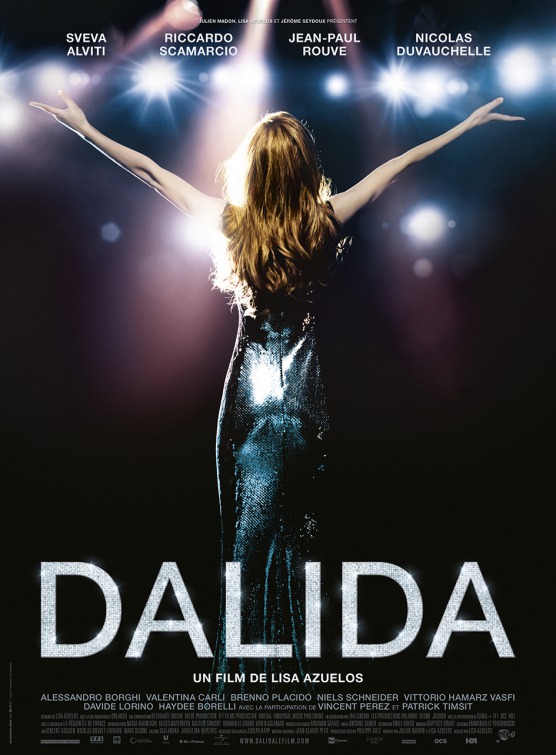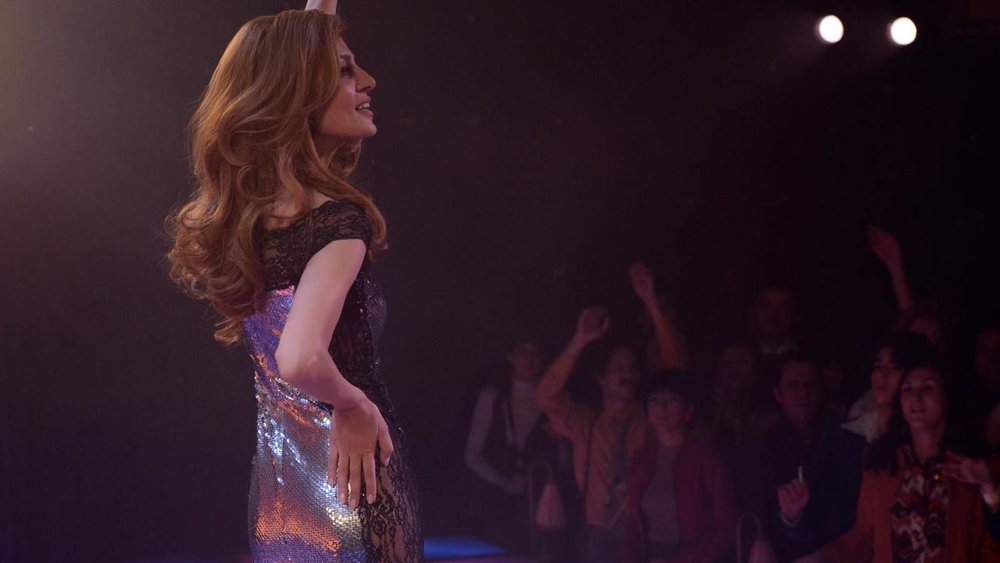Dalida (2017)


SHOULD I SEE IT?
YES
For those interested in the rather remarkable career of Dalida, this movie covers all of the bases.
Great visual flair and beautiful costuming and production design help set the film in a proper context and time frame.
Creates an intriguing look at the excess and vulnerability that comes with being an A-list celebrity.
NO
A hard sell for someone who has never heard of a singer who never found success in the United States, despite an iconic four-decade career overseas.
The movie devolves into melodrama and a highlight reel of big events and tragedies, falling into biopic formula and cliche.
Fails to dig beyond the veneer of celebrity, leaving potentially interesting subplots and details of the singer's life unexplored, for more provocative ones.
OUR REVIEW
In a career that spanned four decades, 30 years, 1,000 songs, and earned her more than 90 gold and platinum records, Egyptian-born and French-residing pop singer Dalida lived a mesmerizing, but tragic life. After her musical breakout in 1956, Dalida's breathtaking beauty and distinctive voice made her an instant star, affording her all the riches and spoils one could hope for, but additionally amplifying vulnerabilities and weaknesses which fame would exploit.
Directed by Liza Azuelos (LOL), Dalida, the film, tells the singer's story in a non-linear way, beginning with her lies to her brother in a French airport in 1967. She would secretly head off to a Parisian hotel and, still reeling from her lover's suicide a month before, would attempt to take her own life. Not successful, Dalida was moved to a facility, where doctors brought in those closest to her to learn more about her struggles.
We traverse through her life at a relatively rapid speed, making Dalida a film that quickly becomes a highlight newsreel of a life, not a deeper and more probing expose into a most interesting of lives. Born Iolanda Gigliotti in Egypt in 1933, Dalida was bullied and rejected by her peers in grade school and saw her family persecuted during World War II. Her vocal talents soon emerged and, in her early 20's, she would be discovered by radio station magnate Lucien Morisse (Jean-Paul Rouve). Smitten with one another, Morisse left his wife for Iolanda and began managing her career.
Once stardom begins to swirl around Dalida, her rise is rather meteoric and soon she meets and falls for the much younger artist Jean Sobieski (Niels Schneider). Their coupling, along with Morisse ending the marriage, was just one of many relationships Dalida found herself in. Along the way, we learn about her wanting children and her repeated desire to step away from the spotlight. However, she finds herself unable to stop the avalanche of fame and celebrity which encompasses her.
Dalida is portrayed by former model and actress Sveva Alviti, who looks fantastic in the role and does a remarkable job of carrying much of the film on her back. Though an ensemble piece, characters drift in and out and Alviti takes us through a vast range of emotions, honing in on divorce, sacrifice, self-worth, and a shocking amount of those close to her committing suicide. Three men she was romantically connected with each took their lives, as well as a close friend. That she died at 54 from suicide is tragic, but not all that surprising based on what she had seen as a means to an end for many who she felt bonded to and with.

Azuelos, who co-wrote a portion of the script with Dalida's brother Orlando, fits 54 years of a life in just over two hours, a difficult task with a woman who experienced so much. Though the film impresses with exquisite costumes and beautiful production design, Dalida struggles in making us invest emotionally in the story being told. Because we are rushing through key moments in her life, via montage or exposition-heavy dialogue, nothing truly resonates deeply.
On a surface level, we feel empathy for what she endures and encounters, but Dalida had her own flaws and is not always presented as the most sympathetic when she often makes decisions that will routinely work against her. One gets the sense that Dalida was a fragile soul who prospered with reassurance and praise and was often way in over her head, but could never fully commit to admitting that to herself.
Azuelos gives us a film that tries to capture everything about a complex artist, but in doing so, dilutes the impact. Understandably, key passages in the film show us Dalida performing music on stage, with Dalida's recordings utilized. And though Alviti does a nice job in the role when it comes to acting, her ability to lip sync and mimic Dalida's diction, vocal style, and presence leaves a lot to be desired. Though it seems petty to rip someone because they cannot lip sync properly, emotional capital is spent quickly when Alviti fails to keep up with the track she is supposed to be "singing" along to.
All in all, Dalida is a decent film, but one that fails to truly move us one way or another. Perhaps, this emanates from American audiences not having a connection to the artist in question, but with a number of biopics released each year, formula and contrived plays for emotion become a trap door this film simply cannot pull itself out from under.
CAST & CREW
Starring: Sveva Alviti, Riccardo Scamarcio, Jean-Paul Rouve, Nicolas Duvauchelle, Alessandro Borgi, Valentina Carli, Brenno Placido, Niels Schneider, Vincent Perez, Patrick Timsit, Michaël Cohen, Elena Rapisarda.
Director: Lisa Azuelos
Written by: Lisa Azuelos (scenario); Orlando and Jacques Pessis (collaboration).
Adapted from the book "Dalida: Mon frère tu écriras mes mémoires" by Catherine Rihot, in collaboration with Orlando.
Release Date: September 1, 2017
Under The Milky Way
